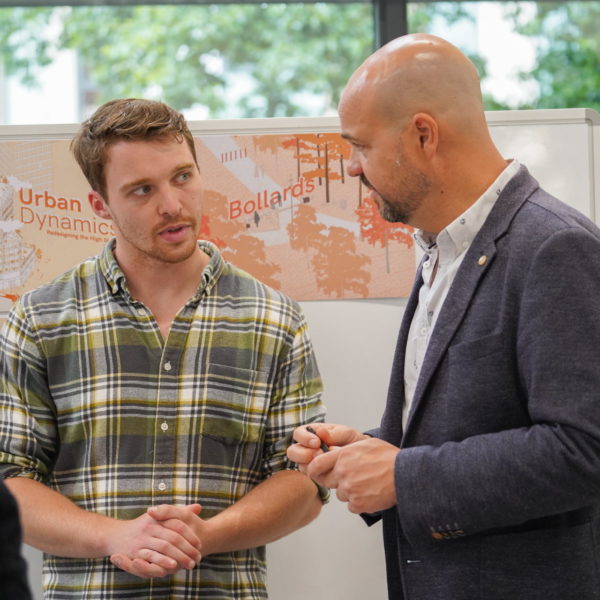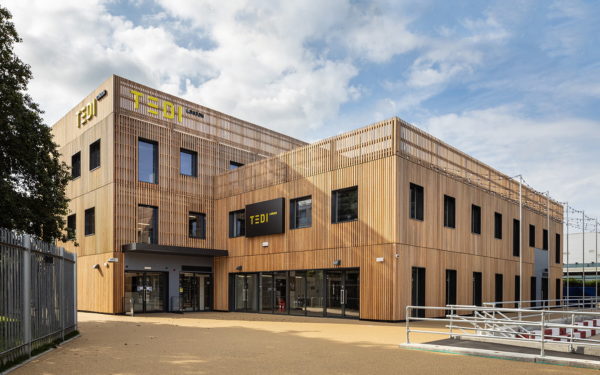
BEng (Hons)/MEng
Global Design Engineering
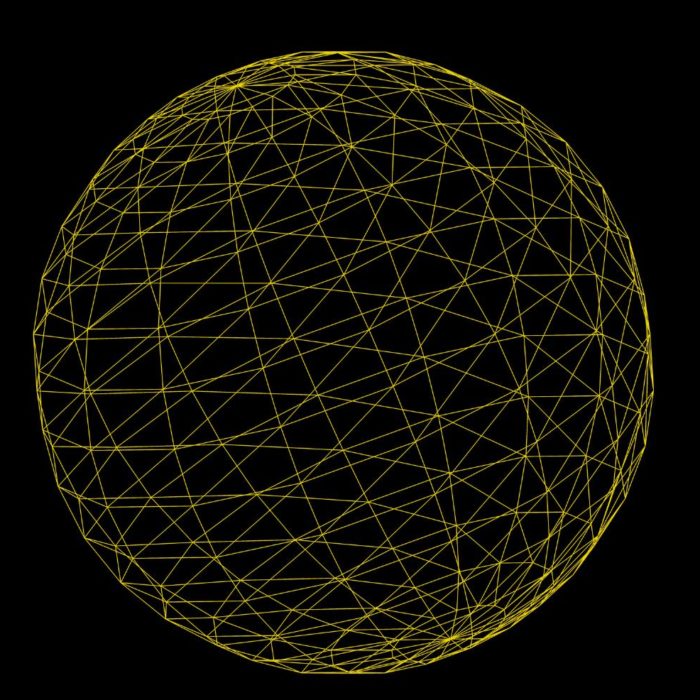
Real-life projects from day one
Through project-based learning and working in partnership with industry you’ll create and contribute solutions to some of the biggest challenges facing the 21st Century and be equipped with the skills employers need from future engineers.
Overview
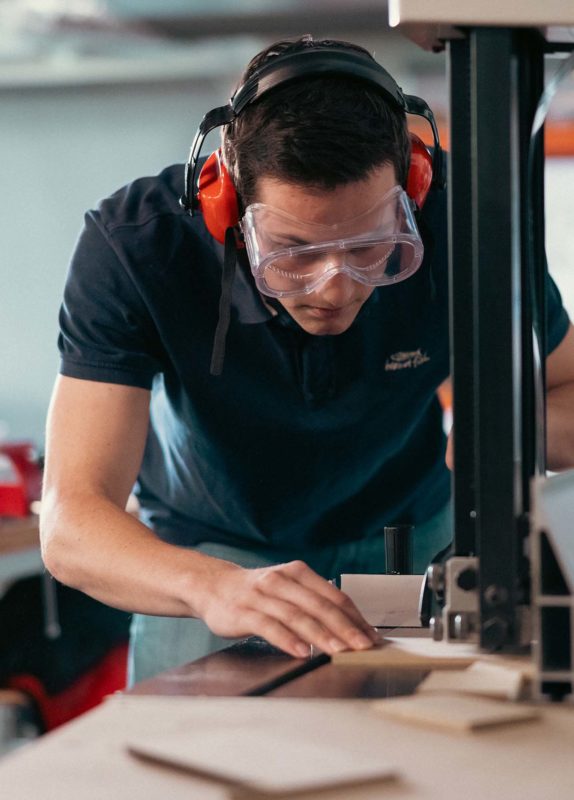
This practical general engineering (honours) degree bridges many disciplines of engineering, including mechanical, electrical and electronic, civil, environmental, and product design. TEDI-London’s aim is to develop professional engineers who are equipped with skills for the future job market.
Projects are developed around key themes such as smart cities, sustainability, user-centred design and manufacturing. These projects will be real-life industry challenges, co-designed with industry and community partners.
This interdisciplinary programme is ideal if you’re interested in all aspects of engineering and don’t want to decide on a specific discipline. The skills and knowledge you’ll gain are equally applicable to systems, products and processes across engineering.
For those who choose to study the MEng (over 4 years) you’ll graduate with an integrated master’s qualification, making you eligible to pursue chartered status as an engineer, without the need for further study.
Course content
The Global Design Engineering BEng/MEng will comprise the following compulsory (core) modules. There are no optional modules and all modules are subject to change.
You can choose to just study this first year content and graduate with a Certificate of Higher Education in Global Design Engineering.
-
Here, we’ll introduce you to the fundamental engineering and design principles. Developing your knowledge and understanding of modern design and development.
You’ll undertake a real-world design challenge in a team, considering the practical, ethical, environmental, social and cultural impacts of engineering design.
You’ll hone your team working, research, critical thinking, problem-solving and communication skills.
-
Develop your knowledge of the fundamentals of the engineering sciences by ‘reverse engineering’ a product (taking it apart). You’ll advance your analytical, measurement and experimental investigation techniques. Gain an understanding of how the fundamentals of the engineering sciences govern the design and performance of systems and components.
Through case studies, and working a design in the reverse direction, you’ll gather data on the engineering principles, manufacturing processes, materials and the assembly. You’ll review competitors and investigate improvements to the design, considering costs, maintenance and the product lifecycle.
-
You’ll start to look at engineering as a professional multi-disciplinary activity. Designing a prototype for a product, you’ll integrate different aspects of engineering and apply the knowledge and skills you have learnt so far to create a solution to a brief.
Through masterclasses and workshops, you’ll work in a team to research, design, manufacture and prototype a product to meet a given specification. You’ll test your prototype and get user and functional feedback to develop your design by implementing the feedback.
Depending on your project, which is usually related to ‘right to repair’, you’ll gain practical skills in prototyping and manufacturing such as 3D modelling, laser cutting and 3D printing.
-
Introducing you to industry-standard modelling and numerical analysis, as well as specialised engineering software packages which are appropriate for a design engineer. Together, we’ll explore and appreciate their potential for solving mathematical and engineering problems.
You’ll cover aspects of mathematical modelling, spreadsheets, principles of computer programming, numerical analysis packages, information modelling, sensors and control as well as cybersecurity. Using these skills, you’ll conduct experiments using sensors, instrumentation, and measurement.
-
Smart cities use data and digital solutions to improve networks, services and infrastructure for the people who live and work there. Learn about designing for smart cities, considering energy and the environment and using material sustainably for a healthy living space.
Develop and apply your understanding of data collection, the Internet of Things, energy and environmental issues, power systems and computing technologies with respect to a global design environment.
Again, working in a team, you’ll consider various engineering technologies to design a safe and clean environment, for your first project on smart cities.
-
We’ll prepare you to start your personal and professional portfolio using the Engineering Council’s academic framework to start your journey to becoming a professional engineer. You’ll begin to become aware of, and reflect on, the development of your academic, professional and personal skills.
In your professional engineering practice, you’ll cover aspects of ethics, codes of practice, time management, problem solving, project management, critical thinking and your professional registration. Alongside, core skills in mathematics, natural sciences and engineering principles.
-
User-centred design is designing things with human factors in mind, so that people and things can interact as safely and efficiently as possible, considering both form and function.
Gain the skills to identify the importance of user centred design and in product and workplace design, as well as the concepts of product visualisation.
Combining aesthetics (beauty of design) and ergonomics (science of design) you’ll work on the design of a consumer product. You’ll collect feedback from consumers and present your findings. You’ll create a concept, develop 3D visualisations, undertake research with focus groups or questionnaires, allowing you to modify and improve your concepts.
-
Understand and use industry standard systematic, design and manufacturing processes. You’ll create practical solutions to solve design problems and develop an awareness of commercial and sustainability issues and how they impact design.
Through masterclasses, workshops and self-directed learning, you’ll work on an industrial design project, usually related to the user-centred product design, considering factors like sustainability, materials and manufacturing methods.
-
Understand and apply the principles and applications of structural, mechanical, civil and smart technologies for the design of smart cities. Together, we’ll cover the fundamental principles of ground and structural engineering and their application in the analysis and design of buildings/built infrastructure. As part of your project, you may consider climate, heating, daylighting and security.
You’ll analyse the assumptions and limitations of structures, adhering to legal, regulations and professional codes. Culminating in a presentation to a technical and non-technical audience of your findings on a complex problem.
-
Appraise and apply ecologically responsible design principles to minimise the environmental impact of your ideas. Working on an eco-design product, process or construction, you’ll assess ecological considerations, whilst applying mathematical, scientific and engineering principles and modelling. Using an ecological approach to design, you’ll consider energy and carbon, the circular economy and materials, climate resilience, biodiversity and water as well as related aspects of well-being.
Collaborating in teams, you’ll evaluate the relationship between design, cost and the ethical and legal requirements in the design of buildings. Advancing your knowledge of the underlying engineering principles.
-
Undertake a project with social responsibility at the heart of it. Utilising innovative technologies, you’ll design a collaborative solution for the community, or groups of people within the community with specific needs. You’ll research your audience, and co-create your solution, through experimentation, testing and evaluation.
While working with your primary stakeholders, you’ll gain skills in real sustainability challenges, stakeholder partnerships, transdisciplinary formal participation, learning loops, co-creation and the use of virtual environments.
Supporting your project, you’ll create and develop a website to effectively communicate your user centred design solution.
-
Building on your personal and professional portfolio from Year 1. You’ll continue to map your progress against the Engineering Council framework to demonstrate how you are developing towards becoming a professional engineer. You’ll also consider how the projects you have undertaken relate to particular UN Sustainable Development Goals.
This will cover your development and advancement of a systematic approach to project management, solving complex problems, your skills in mathematics, statistics, natural science and engineering principles, as well as reflecting on your personal and professional development.
-
As you progress into Year 3, you’ll be given more complex challenges and, here you’ll learn to apply systematic analysis to advanced engineering processes and quality management systems to design for a flexible, lean or agile environment.
In groups, you’ll look at the optimisation of products, to ensure optimal performance whilst seeking to reduce materials, time and/or cost. You’ll also develop your knowledge in areas such as quality and engineering management of the design and build processes.
-
Providing you with the knowledge and skills attributed to successful innovators, and entrepreneurs. Discover the modern drivers of successful innovation, and the various models that have proven ongoing success. Producing an original design, you’ll have the opportunity to innovate and apply your entrepreneurial skills to design engineering. In facilitated workshops, together we’ll examine innovation and entrepreneurial case studies. Through collaboration with an external organisation, you’ll develop your design project along with a business plan, with a managerial, entrepreneurial and design mindset.
-
Reflecting on all your projects, skills gained, and methods used throughout your degree, you’ll continue to work on your personal and professional portfolio. Underpinned by the Engineering Council’s framework, you’ll demonstrate your progress towards becoming a professional engineer. In particular, you’ll be reflecting upon how your recent experiences relate to the UK-SPEC (UK Standard for Professional Engineering Competence and Commitment) areas of competence. You’ll consider your career trajectory and plan for your specialisation, further study or career prospects.
-
Integrate all your knowledge from your previous learning to complete a major individual project. You’ll be expected to use an analytical and methodological approach involving elements such as project planning, designing, implementation, testing, quality assurance and evaluation and you’ll present your findings in a formal setting. Your project will be a significant piece of work, possibly related to the UN Sustainable Development Goals, smart cities, big data or informed by an industry need.
-
When you enter Year 4, you’ll develop your skills for designing innovative solutions to complex global challenges. Here, you’ll advance your expertise in utilising cutting-edge engineering principles, methods and tools to address diverse socio-technical problems in engineering. You’ll research real world case studies, showcasing pioneering projects in subject areas such as civil electrical/electronic, materials, and mechanical engineering, demonstrating the application of advanced engineering principles in diverse design contexts.
-
Effective leadership is the ability to successfully influence and support a team to deliver a shared goal. Here, you’ll learn what it means to be a good leader. You’ll look at the difference between management and leadership, what leadership is, various leadership styles and theories, how to plan strategically, recognising leadership traits, how to develop effective leadership skills, how to create a vision, set the tone, listen effectively, handle conflict, overcome challenges, and address ethics in leadership.
You’ll understand, reflect and improve your own leadership performance. By exploring theories, applying them practically, and reflecting on your experiences, you’ll develop the skills necessary to lead diverse teams, manage complex projects, and drive innovation in a globalised engineering environment. -
Leverage digital tools and methodologies to enhance your engineering designs, analyses and implementations. Evaluate the potential of emerging digital technologies such as Artificial Intelligence (AI), Internet of Things (IoT) and Virtual Reality (VR) in the context of Design Engineering projects. You’ll integrate some of these digital technologies into your design process to improve efficiency, innovation, and sustainability, whilst considering the diverse cultural and contextual factors inherent in engineering projects. You’ll critically assess the security, ethical, legal, and socio-economic implications of using digital technologies in engineering, demonstrating an understanding of responsible invention and the promotion of societal well-being.
-
Explore the principles of Design for Excellence (DfX) and its diverse applications in the field of design engineering. We’ll equip you with the capabilities and proficiency for applying design principles to achieve excellence across various dimensions. Emphasis will be placed on fostering a holistic understanding of design considerations and may include performance, sustainability, usability, manufacturability/buildability and repairability amongst other factors. You’ll look at emerging trends and multi-criteria for analysing design decisions for Design Excellence, resulting in persuasively communicating your solutions and design decisions to both technical and non-technical audiences.
-
Apply your project management, commercial and business skills in your Global Design Group Project. Working in teams, you’ll develop a working prototype, technical specification, supply chain analysis, manufacturing plan, a five-year business plan, marketing strategy and identification of sources of start-up funds. You’ll critically review new and emerging technologies and use this information to create innovative designs for products, systems, components or processes to fulfil new needs. You’ll also consider business practices within the commercial, economic, legal and social context of engineering processes, evaluating customer and user needs, and being mindful of the need to promote sustainable development.
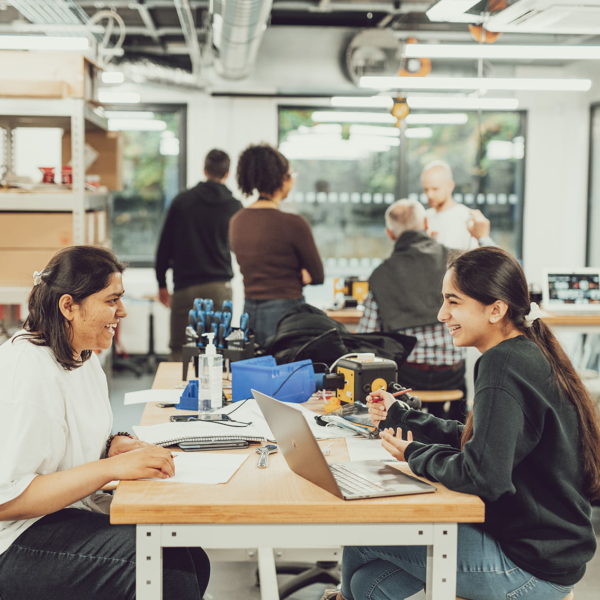
Forget lectures
You’ll work hands-on in our ‘makerspaces’, both individually and in groups, to research, design and create conceptual designs, or artefacts and prototypes. You’ll be guided through the project and problem-based learning approach through tutorials that provide the opportunity to discuss challenges associated with the projects and share your ideas and learn from each other.
Teaching comprises workshops, masterclasses, group discussions and practical sessions in the makerspaces. This is supported by individual theoretical study through our online learning environment.
Assessment is a mixture of group project reports, individual reports, pitches, presentations, demonstrations, short videos and posters. There will also be two open book examinations at the end of each of your first two years.
See project examples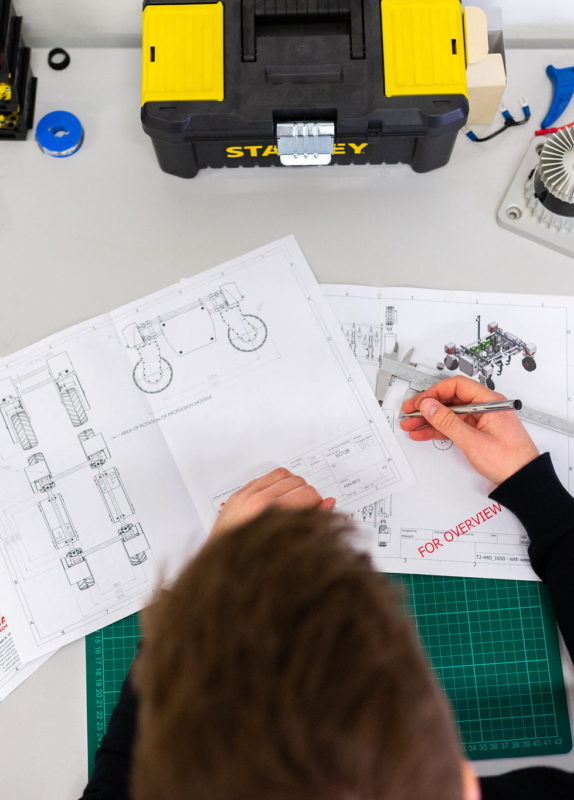
Study modes
CHOICE OF TWO START DATES: Whilst our courses start in September, we offer a second intake in January to give you the chance to study the same programme on a different timescale.
It’s a great opportunity if you’ve missed the September deadline and don’t want to wait until the following year, or are rethinking your options for study. Please note our second intake is intensive for the first semester, and you’ll also attend a mandatory Summer School in the July of your first year.
Industry skills
Most projects will involve industrial collaborations, with links to real-life developments and challenges facing those industries.
Working with industry
Unlike a degree apprenticeship, TEDI-London students will be working with multiple employers, rather than just one. This provides a wider experience and broader exposure to potential employers – it also allows you to build a portfolio of project experience and delivery, to present, reference and discuss at job interviews. You’ll be engaging with industry in a professional capacity from the very start of your programme.
In your third year, you’ll have the opportunity to complete your major project either in partnership with industry, or with one of our founding partners in Arizona or Sydney*.
We offer opportunities for summer internships to our students, usually between their 2nd and 3rd year, opportunities range from roles in global responsibilities to tech companies.
*Study abroad eligibility for International students is subject to visa status and any travel restrictions.
Entry requirements
The following criteria is intended as a guide to help you gauge if TEDI-London is for you:
- If studying A Levels, IB, BTEC (or any post 16 education) you’ll be on track for approximately 112-120 UCAS points or equivalent
- GCSE Maths grade C/4 (or equivalent Level 2 qualification)
- You may be invited to an online interview
No Maths A-Level? No problem
We are not saying maths isn’t important to study engineering – it is! However, we don’t see a Maths Level 3 qualification as essential to studying with us and becoming an incredible future engineer. Alongside all the other engineering skills that you’ll develop, we’ll support you throughout your maths journey with us, and it’ll become yet another tool to help you change the world for the better.
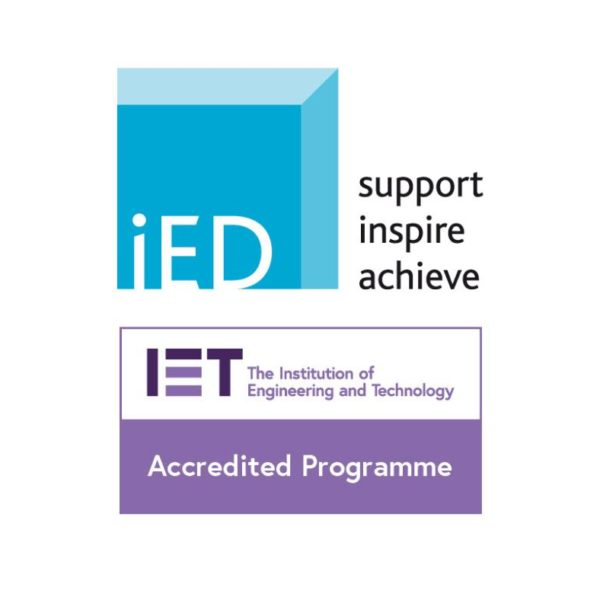
An accredited degree
Our BEng (Hons) Global Design Engineering programme is accredited by the Institution of Engineering Designers and Institution of Engineering & Technology as partially fulfilling the academic requirements for professional registration as a Chartered Engineer (CEng). Student membership is free to students for the duration of their studies.

IHE award winner
Our Global Design Engineering programme was awarded ‘Inspiring Course’ at the Independent Higher Education Awards 2024.
TEDI-Londoners
Our students share their experience of studying Global Design Engineering so far and why they think other future engineers will enjoy it.
After you graduate
Further study
After the 3 year BEng, you’ll have several opportunities open to you. Here are some paths you could take to pursue further study:
- Instead of completing the BEng, you could choose to progress to the TEDI-London MEng in Global Design Engineering (subject to meeting the required grades)
- Head to Arizona State University to study a MS User Experience at the Ira A. Fulton Schools of Engineering or their MEng Engineering program (being launched as an in-person programme in Autumn 2027). Students graduating from TEDI-London BEng have guaranteed entry to these ASU Master’s programmes (subject to grades and visas)
- If you want to specialise in a particular field of engineering, you can apply to study a specialised Master’s.
After your Master’s you could either choose to pursue further postgraduate study e.g. an Engineering Doctorate (EngD) or enter the workplace.
Design engineering is a varied and in-demand career. Our degree will equip you with interdisciplinary skills suited to a range of engineering roles across diverse sectors when you graduate.
Examples of jobs you could go into include:
Design Engineer
Mechanical Engineer
Environmental Engineer
Sustainability Engineer
CAD Technician/Engineer
Product Design Engineer
Electrical Design Engineer
Project Manager
3D Designer
User Experience Designer
Consultant
Our course information at DiscoverUni
Bachelor of Engineering BEng (Hons)
Integrated Master of Engineering MEng (Hons)
